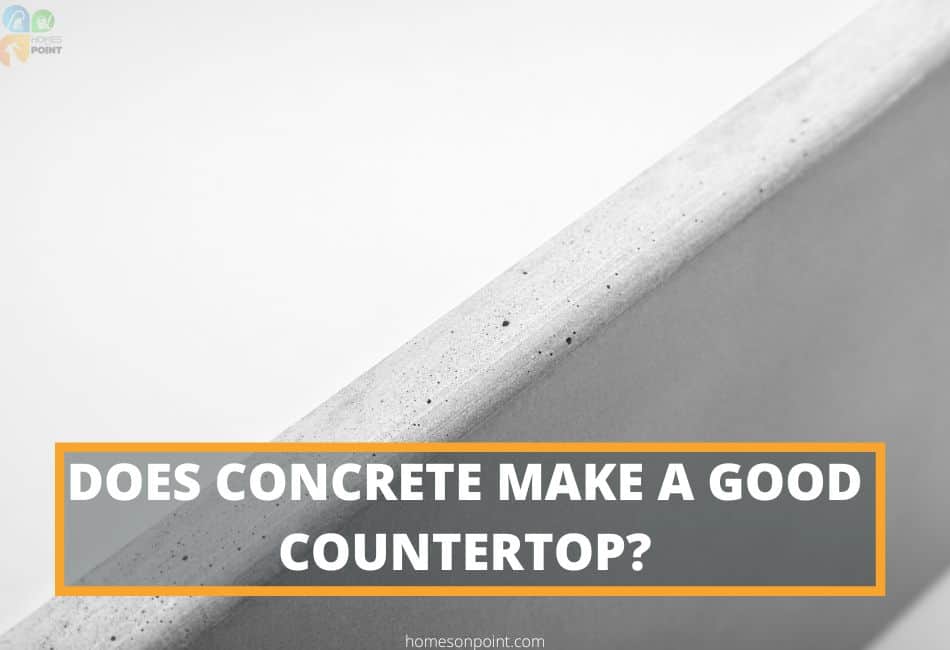Homeowners today have an endless choice when it comes to countertop materials. There’s a granite countertop, quartz countertop, marble countertop, laminate countertop, soapstone countertop—and that’s just to name a few. There’s also the option for concrete.
Concrete is an increasingly popular material for countertops, but it remains a controversial subject. There is a lot of debate surrounding the use of concrete as a countertop material. Some people swear by it, while others think it’s a terrible idea. Some people love concrete counters for their versatility, unique look, and durability. Others find them as utilitarian, cold, hard, and difficult to care for.
So, what’s the truth? Does concrete make a good countertop? In this article, we will take a look at the pros and cons of using concrete counters in your home.
Overview Of Concrete Countertops
Concrete is a mixture of cement, water, sand, and gravel. It’s often used in construction projects because it’s strong and durable. When concrete is used for countertops, it’s mixed with other ingredients to improve its appearance and performance.
Modern concrete countertops are no longer the cold, industrial-looking surfaces of the past. They can be made in any color, shape, or thickness. They can also be textured and polished to create a smooth, shiny surface. Concrete counters can also be made to look like other materials, such as wood or marble. Because concrete is porous, it can also be sealed with a stain-resistant sealer to protect them from spills and stains.
Concrete countertops come precast or cast-in-place and are often reinforced with metal or fiberglass. Precast concrete countertops are made in a mold and then cured in a controlled environment. Cast-in-place concrete countertops are made on-site and then cured.
If you are considering concrete countertops, here are some of the pros and cons to keep in mind.
Pros Of Concrete Countertops
1. They Are Durable
When it comes to concrete countertops, durability is one of the most commonly cited pros. Concrete is a very strong material, so concrete countertops are built to last. It’s often used in construction projects because it can withstand a lot of wear and tear. Concrete countertops are no different. Most concrete countertop makers reinforce their concrete with metal or fiberglass to make them even more durable and exceptionally strong. If properly sealed and maintained, concrete countertops can last for a lifetime.
2. They Are Versatile
Concrete can be made in any color, shape, or thickness. It can also be textured and polished to create a smooth, shiny surface. Concrete counters can also be made to look like other materials such as granite or marble.
Different items like decorative stones, glass, and shells can be embedded into the concrete to create a one-of-a-kind look. You can also add color to concrete countertops to make them match your kitchen’s decor.
It can also be designed with integrated lighting or concrete that glows in the dark. The possibilities are endless when it comes to concrete countertops They can be molded to your precise design needs, shaped and formed to match your kitchen dimensions, and finished to your exact taste. Other countertops, on the other hand, are restricted to whatever color, form, and size the manufacturer decides to make.
3. Premium Material
Many people consider concrete countertop as a premium surface and for good reason. Concrete is a high-end material that adds both beauty and value to your home. concrete countertops are unique, stylish, and luxurious. They are also very easy to clean and maintain.
It is believed to be an excellent investment for any homeowner and can increase the value of your home.
4. They Do Well With Scratches
Concrete countertops are not scratch-proof but are more scratch-resistant than most other countertop materials like laminate and marble. Concrete is a very hard material, so it’s not easy to scratch. Even if concrete countertops do get scratched, the scratches are usually not very noticeable because they blend in with the concrete surface.
Cons Of Concrete Countertops
1. Stain Easily If Not Sealed Properly
While concrete countertops will last for many years, they can stain if they are not sealed properly. Concrete is a porous material, so it can absorb spills and stains. To avoid staining, you need to reseal your countertop regularly.
You also need to be careful with what you put on concrete countertops. In theory, sealed concrete countertops can resist most stains, but in reality, sealed countertops can even show stains from fruit juices, red wine, and oil so it’s best to take extra precautions. If you spill something on your concrete countertop, you need to clean it up right away.
2. Regular Sealing Is Required
Concrete countertops need to be sealed very often to keep them from staining. At a minimum, it required annual sealing but some concrete countertop experts recommend that you reseal every few months. Resealing is not a difficult task but it can be a hassle for some people and it’s an extra expense that you need to budget for.
3. Prone To Bacteria Growth
Another potential downside of concrete countertops is that they can easily develop bacteria growth. When not sealed properly, concrete can absorb liquids, which can lead to the growth of bacteria. If you are looking for a countertop that is bacteria-resistant, concrete might not be the best option. However, concrete countertops that are sealed properly can be just as bacteria-resistant as any other type of countertop.
4. They Are Expensive
Concrete countertops are not cheap. They are more expensive than most countertop materials. If you ever thought concrete was an affordable option, think again. concrete countertops can cost anywhere from $65 to $135 per square foot. This does not include the cost of installation, which can add another $40 to $60 per hour, per person.
Concrete countertops are a significant investment, and you need to be sure that you are ready to make this investment before you get started.
5. It Takes Time To Install Concrete Countertops
Concrete countertops are not a weekend DIY project. They take time to install, and the process is very messy. Concrete countertops need to be poured, designed, cured, and sanded. The entire process can weeks to complete and you’ll need to have a lot of patience when opting for concrete countertops. If you are in a hurry, concrete countertops are not the right option for you.
6. They Are Very Heavy
Concrete is a very heavy material, so concrete countertops are also very heavy. They can weigh up to twice as much as other countertop materials. This means that you need to have strong cabinets and flooring that can support the weight of concrete countertops. If not properly installed, concrete countertops can put additional stress on your cabinets and cause them to break or sag over time. It is therefore important to have proper support for concrete countertops.
How To Maintain Concrete Countertops
Depending on the type of finish applied to the concrete, maintenance will vary a little bit but here are some basic tips:
Use pH-Neutral Cleaners
To clean concrete countertops, use a pH-neutral cleaner and a soft cloth. Avoid using abrasive cleaners that can wear away the concrete sealer. Once the sealer is removed, the concrete becomes exposed and more susceptible to damage.
Most concrete countertop cleaners are very mild, which allows for the sealer to remain intact. Do not use anything aggressive such as bleach or ammonia. The chemicals will eat away the finishing. This doesn’t mean occasional spills will ruin your concrete countertop but frequent use of these chemicals to clean your countertop will definitely damage the sealer.
Seal Concrete Countertops Regularly
As indicated earlier to keep concrete countertops from staining, it’s important to seal them regularly. concrete countertops should be sealed at least once a year but some experts recommend resealing every few months.
Wipe Spills Immediately
Concrete countertops are very porous and can absorb liquids easily. To prevent staining, it’s important to wipe up spills as soon as they happen. Yes, it is true the sealant will provide some protection but it’s still best to clean up spills immediately. When stains are allowed to solidify on concrete countertops, they begin to leave stain marks that may be difficult to remove.
Don’t Use Sharp Objects Directly On The Countertop
Concrete countertops are very hard and durable but that doesn’t mean you should use them as a cutting board. Treat your concrete countertop as a laminate countertop and don’t cut directly on it. Concrete countertops can scratch and chip if you’re not careful. If the concrete countertop is sealed, it can resist scratching and chipping to a certain extent but frequent cutting directly on the countertop will eventually damage the sealer and concrete. It’s best to use a cutting board when using sharp objects on concrete countertops.
Use Hot Pans With Care
You can place hot pans on concrete countertops but you need to be careful. concrete countertops can withstand high temperatures but if you place a very hot pan on concrete, it can cause the sealer to break down, exposing the concrete to staining and cracks. If you must place a hot pan on concrete, use a trivet or hot pad to protect the concrete countertop.
Regular Cleaning
You have to protect your investment with regular cleaning. This will go a long way in maintaining the concrete countertop’s beauty and durability. Don’t wait till the concrete countertop is very dirty before you start cleaning. A little preventative maintenance will save you a lot of time and effort in the long run. Using dish soap and warm water is usually enough to clean concrete countertops on a daily basis. For tougher stains, you can use a concrete cleaner or white vinegar.
White vinegar is a great cleaning agent for concrete countertops because it’s acidic and will eat away at the dirt and grime without damaging the concrete. Just be sure to rinse the area well after cleaning with white vinegar.
Baking soda is another great cleaning agent for concrete countertops. It’s a gentle abrasive that will scrub away dirt and grime. Just make a paste of baking soda and water and scrub the concrete countertop with it. Rinse well with water when you’re done.
Final Thoughts
Concrete makes a great countertop material because it’s very durable and has a unique look. If you want something unique for your kitchen or bathroom, concrete is a great option. They also come with their own maintenance and issues which is worth noting. If you have an interest in concrete countertops, plan carefully and hire a professional to build and install them for you. Thanks for reading.

